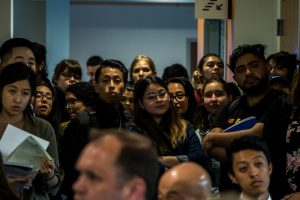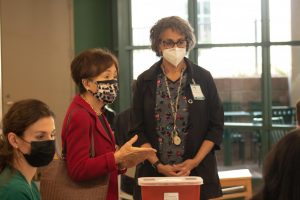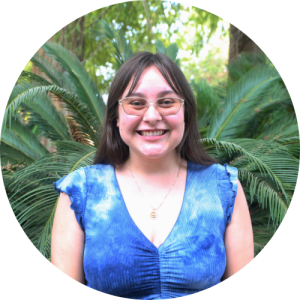Sac State’s immunocompromised community reflects on a year of COVID-19
‘For my husband and I, it could be life or death’
Sierra Ortiz, art major, puts on her face mask before she heads out to run errands on Wednesday, March 10, 2021. Ortiz said she makes it a priority to wear her mask before she goes out in public to keep herself safe during the COVID-19 pandemic.
March 15, 2021
March 2021 marks one year of the world enduring isolation, safety guidelines and a new way of life during the COVID-19 pandemic.
Among the Sac State community that have endured this isolation, are people who are immunocompromised, or people who have a compromised immune system. An immunocompromised person may have underlying health conditions like cancer, asthma, heart conditions or diabetes, according to the Centers for Disease Control and Prevention.
Also according to the CDC, people with underlying medical conditions are “at increased risk for severe illness from the virus that causes COVID-19” and are more likely to face hospitalization, intubation, and death if they are exposed to the virus.
Approximately 37% of the United States population, or 92.5 million people, are at a higher risk of serious illness if they contracted COVID-19, according to the Kaiser Family Foundation.
RELATED: EDITORIAL: Please, get the COVID vaccine
The State Hornet spoke to those who are immunocompromised or those who are living with immunocompromised family members.
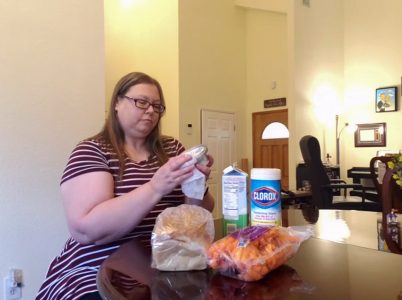
Jennifer Rineman, a junior at Sac State majoring in music, said she has been isolating with her husband Michael since the beginning of the pandemic. Her husband has asthma and high blood pressure, making him at higher risk for COVID-19.
To protect herself and her husband, Rineman said she stays home to reduce the risk of catching the virus.
“I miss going out and doing things I used to do,” Rineman said via email.
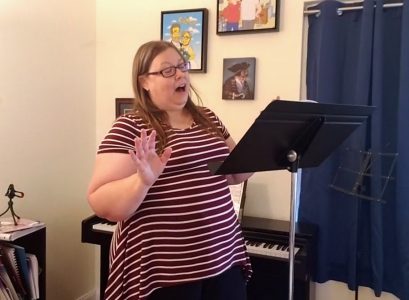
Before the pandemic, Rineman said she used to perform in theatre and swing dance. Now, Rineman said she participates in these activities virtually.
“I participated in a couple of virtual choirs and produced a livestream concert with several of my singing friends,” Rineman said. ”It’s not the same, but better than nothing!”
In order to keep her husband and herself healthy, Rineman said she disinfects everything she can.
“We also sanitize our groceries, even though surfaces are an unlikely form of transmission,” Rineman said. “We wash our hands after contacting anything from the outside world.”
After waiting for months, Rineman said she and her husband both received their first dose of the COVID-19 vaccine. Rineman said this allowed her and her husband to feel safe going out and having people over who are also vaccinated.
“I am so happy, I felt a big wave of relief when it was done,” Rineman said.
Rineman said her main frustration after a year of the pandemic is the carelessness and ignorance of others.
“My biggest frustration is the callousness of people who think it’s acceptable for 500,000 people to die [rather] than to let the economy dip,” Rineman said. “I’m frustrated that those who are not at risk, who don’t mind if they get sick, don’t think about who they may pass their illness onto.”
Rineman said that for someone not at a higher risk, it may seem as if there are no consequences to being exposed to COVID-19. However, for the married couple, she said the situation is the polar opposite.
“For my husband and I, it could be life or death, or at least an expensive hospital stay,” Rineman said.
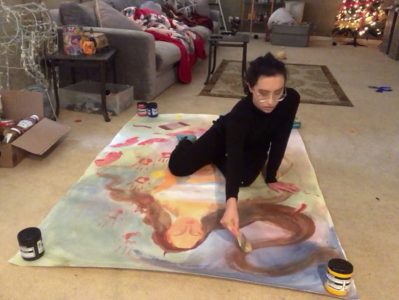
Sierra Ortiz, an art major at Sac State, has asthma and is also at a higher risk for COVID-19. Ortiz said that the pandemic has added a new layer of precaution to her way of living.
“It forced me to take my asthma and other health more seriously,” Ortiz, 24, said via Instagram DM.
During the pandemic, Ortiz said she has missed out on concerts, art workshops and family birthdays.
“I miss my friends and family that I rarely or never see anymore,” she said.
Ortiz said she socializes safely by only seeing the same people and enjoys creating projects with friends.
“The frequent way I’ve socialized is doing creative projects like photography, while being masked and distanced,” Ortiz said. “I’ve sat outside on my friend’s lawn or driveway while we talk from a distance.”
When Ortiz does leave her house, she said she does her best in ensuring she is keeping herself safe by carrying hand sanitizer, taking a shower immediately after returning home and cleaning her home space with bleach.
Ortiz said she plans on taking in-person classes fall 2021 to get the most out of her education.
“I plan on taking in-person classes in fall 2021, not because I think COVID will be gone, but because I want the structure of in-person art classes,” Ortiz said.
However, at this point in time, Ortiz said she does not think it is safe to go back to campus because the vaccine is still being distributed and not everyone is vaccinated.
Ortiz said people her age who socialize without a mask may not think the pandemic is as serious as it is, but she has legitimate fears about getting sick.
“I’ve had fears during this pandemic around family, around friends I dared to see, or maybe someone stood too close to me at the grocery store and if I were to catch COVID-19, I risk dying,” Ortiz said.
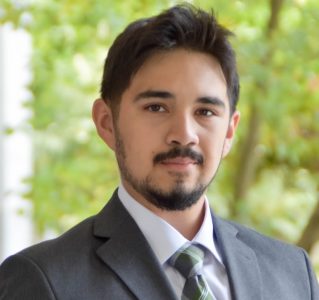
Nick Soliz, 24, graduated from Sac State in spring 2020 with a bachelor’s degree in political science. Due to the pandemic, he could not attend his commencement and has been isolating with his mother since the beginning of the pandemic.
Soliz said his mother, Veronica, lives with an autoimmune disorder and takes immunosuppressants.
“It’s aggravating to see someone wear their mask wrong and take things too casually because they aren’t considering people like my mother or the rest of the population,” Soliz said via email.
Soliz said the pandemic also caused some complications for his mother because she was unable to receive treatments for her autoimmune disorder due to the pandemic.
“For the first three months, my mom couldn’t get treatments due to her specialist not taking appointments,” he said. “There was a shortage of her medication and concern it would become unavailable.”
Neither his mother or Soliz have seen their friends since the start of the pandemic, he said.
Soliz said he was forced to take a gap year due to living at home and wanting to protect his family, especially his mother, from contracting COVID-19.
“I have a household of 6, so if one of us gets the virus, we all will,” Soliz said.
Soliz said his family has found ways to bond together during this time while being confined at home.
“We all like to watch movies and play games with each other,” he said.
Soliz said he and his mother have not yet received the vaccine but are eager to get it.
Soliz said he plans on returning to Sac State in fall 2021 to further his education in the public policy master’s program and hopes that classrooms will be safe by then.
Sac State public health professor Patty Woodward said her experience living as an immunocompromised person in the wake of the world changing has caused her to worry about her health more than usual.
Woodward, 66, said that when the lockdown started last March she was concerned and kept worrying about ‘what if’ scenarios and what would happen in the pandemic.
Woodward said she was worried about not having access to her injections for asthma. If she misses an injection, she risks catching pneumonia, she said.
“Thankfully my doctor’s office was quick to assess and set up stringent protocols for injections so I didn’t miss doses this past year,” Woodward said via email.
Although Woodward said she has not had any COVID-19 scares and has not had the virus, she said she has had friends and students lose family members to COVID-19, which has made her appreciate everyone in her life that is staying safe and following safety protocols.
Woodward said she received her second dose of the COVID-19 vaccine on Feb. 19 and said she had no negative reactions to it.
Woodward said she has faced a lot of frustrations a year into the pandemic.
“As a public health educator, it has been so frustrating to watch it turn political,” she said.































































































































